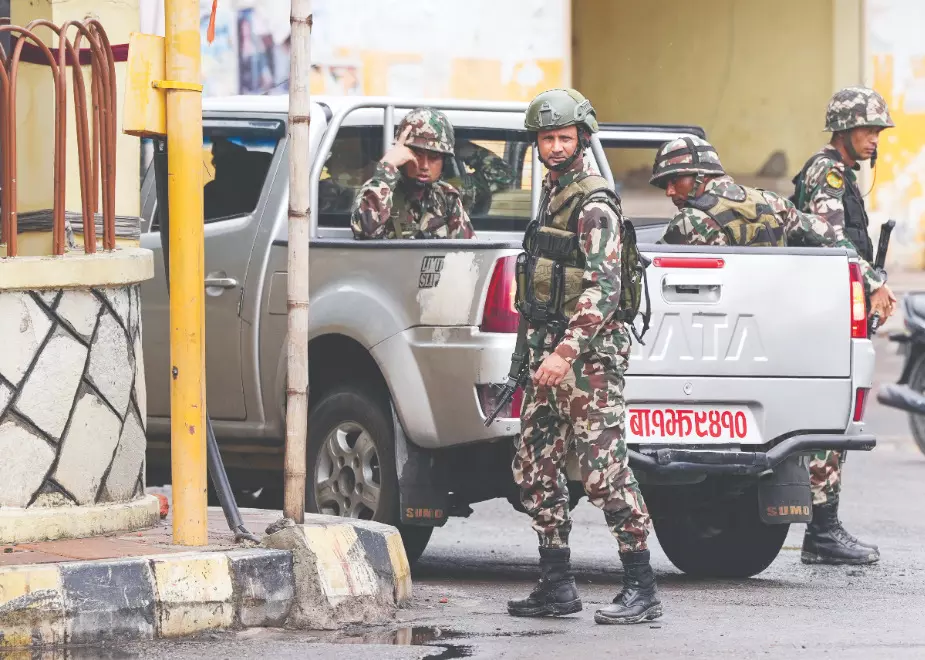Nepal’s political deadlock deepens as Gen Z splits on interim chief choice

Kathmandu/ New Delhi: The stalemate over the appointment of an interim leader in Nepal persisted on Thursday, even as President Ramchandra Paudel urged restraint and pledged to seek a resolution to the country’s crisis within the bounds of the Constitution.
Despite days of unrest, the capital remained relatively calm, with army personnel patrolling key areas under extended curfew orders. Officials confirmed that the death toll from violent protests earlier this week has risen to 34.
The demonstrations, led largely by youth under the “Gen Z” banner, intensified after the removal of Prime Minister K P Sharma Oli on Tuesday. Protesters have demanded sweeping political reforms and pressed for the formation of a transitional government.
Talks between Gen Z representatives and senior military officials stalled as the two sides debated who should lead the interim administration. Names under consideration included former Chief Justice Sushila Karki, Kathmandu Mayor Balendra Shah, former Nepal Electricity Authority chief Kulman Ghising, and Dharan Mayor Harka Sampang.
While some activists threw their weight behind Karki, others voiced preference for Ghising, leaving the leadership question unresolved. “We are holding rounds of talks with different stakeholders. The discussions are mainly focused on breaking the stalemate while ensuring law and order,” an army spokesperson said without confirming any names. Sources indicated that Mayor Shah has expressed support for Karki, though no consensus has yet been reached. President Paudel, who has been under military protection after protesters set fire to his office and private residence earlier this week, addressed the nation for the first time since Oli’s ouster. “I am making every effort to protect democracy and to find a way out from the present political impasse within the constitutional framework while at the same time maintaining law and order,” he said. Appealing for unity, Paudel added, “I request all parties to have confidence that a solution is being pursued and to cooperate in maintaining peace and order in the country with restraint.”
The Ministry of Health reported that 34 people have been killed in the protests, with 1,338 injured under treatment and nearly 950 discharged from hospitals.
Unrest has also extended into the prison system. More than 15,000 inmates reportedly escaped from at least 25 facilities after protesters stormed prisons, set buildings ablaze, and forced open gates. At the Ramechhap district prison, three inmates were killed and 13 others injured in clashes with security forces on Thursday, bringing the total number of prisoner deaths since Tuesday to eight.
Gen Z leaders reiterated their call for the dissolution of Parliament and constitutional amendments to reflect popular demands. Speaking at a press briefing in Kathmandu, one activist warned traditional parties not to exploit the movement: “This is purely a civilian movement, so don’t try to play politics with this.” Another activist, Diwakar Dangal, urged unity. “There is a challenge in front of us to protect national sovereignty and unity and maintain self-respect. We all Nepalese should unite in this difficult situation to safeguard the welfare of our people.”
While rejecting calls to scrap the Constitution, activists pressed for “major amendments to include people’s concerns.” The army extended prohibitory orders in three districts of the Kathmandu Valley. Public movement is allowed during specified windows, but a night curfew will remain in force through Saturday morning. The military warned that acts of arson, vandalism, or attacks on individuals would be treated as criminal offences.
In Kathmandu, residents rushed to markets to stock up on essentials during brief curfew relaxations. Roads showed signs of earlier clashes, though vehicular movement was minimal.
Security forces said they had disposed of eight improvised explosive devices in Banepa, 60 km east of the capital, and seized 97 illegal weapons looted from security personnel during the riots.
The violence has disrupted major institutions. The Supreme Court, whose premises were damaged by rioters on Tuesday, announced that it will resume registering and hearing petitions from Sunday. “Important documents from Nepal’s judicial history are on the verge of destruction,” Chief Justice Prakash Man Singh Raut warned in a statement.
The central bank, Nepal Rastra Bank, has directed commercial banks to reopen from 10 am to 2 pm after being shut due to unrest.
The Department of Immigration also issued a notice easing exit permits for foreigners. Those whose visas expired after September 8 will be allowed to leave without penalty, while special provisions have been made for individuals who lost their passports during the turmoil.



